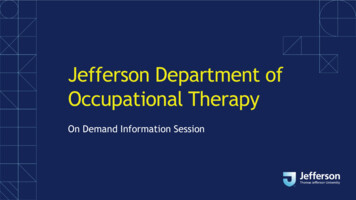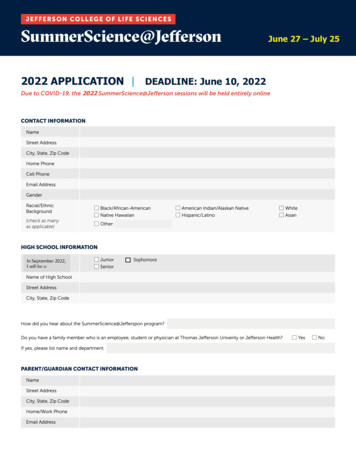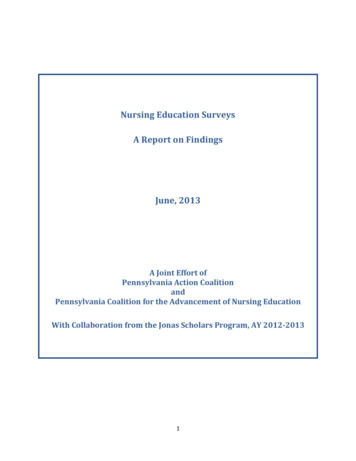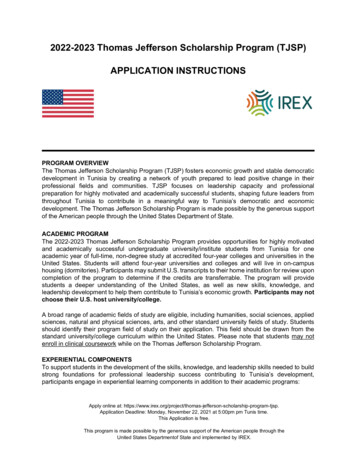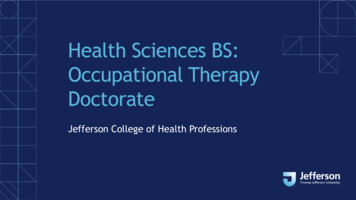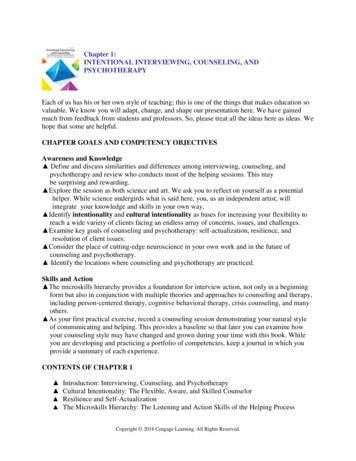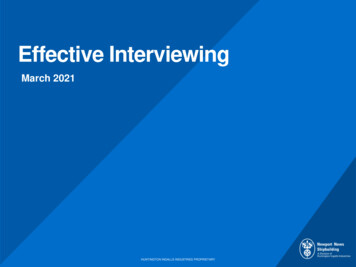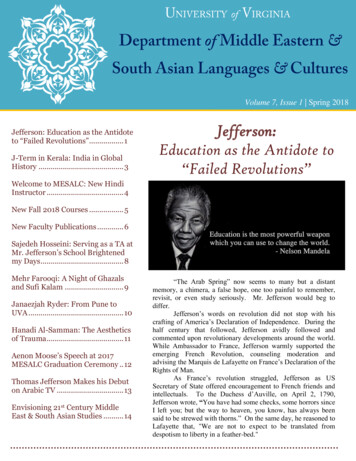
Transcription
Interviewing SkillsHandbookInformation provided by:The Career Development CenterEdison Building, Suite 1120(215) .development@jefferson.edu
INTERVIEW SKILLSTable of ContentsAn Interview is Arranged. Now What?During the InterviewImproper QuestionsAfter the InterviewPhone InterviewsTypes of InterviewsJobseekers with DisabilitiesPg. 2Pg. 6Pg. 7Pg. 8Pg. 9Pg. 10Pg. 11An interview is an exchange of information. It allows the employer to evaluate your personality,communication skills, attitudes, values, motivation, interests, and technical skills. The interview alsoenables you to obtain information about the organization in order to make an informed decision.An interview is a discussion between equals. Although you need to treat the interviewer(s) with respect,there is no need to be overly deferential.Knowing how to interview is one of the best skills you will ever have. The following information willprovide you with steps to effective preparation, success on the interview day and effective follow-up.
AN INTERVIEW IS ARRANGED. NOW WHAT?Be Prepared!Prepare for the interview by researching the organization. You should know enough about the organizationto justify why you are seeking employment with them and to come up with insightful questions.Research the Organization’s Website Look at all current openings. What other types of jobs are available at the organization? This canprovide you with helpful information about career paths, etc. Look at the website from the vantage point of a client or patient. How does the organization present itselfto its patients/clients? Mission Statement: Familiarize yourself with buzzwords, main concepts, and value statements. Annual Reports: Date they were established, populations served, notable accomplishments, researchendeavors, unique qualities of the organization, recent mergers or acquisitions, etc.Networking Try to find Jefferson alumni at the organization. Give them at least a week to respond to you, orpossibly longer. Don't ask what the interview questions will be. Do ask about their own experiencesworking for the organization, workplace culture, etc. Using LinkedIn is a great tool to connect withJefferson alumni. (www.linkedin.com) See if the Career Development Center has any contacts with the employer. Consider asking them someof the same things you might as Jefferson alum (i.e. workplace culture, unique aspects of his/herposition, etc.) Go to Symplicity to research employer contacts: ne Your Strengths Think about your strengths and unique experiences and how they might relate to the healthcare facility.For example, you may be interviewing with a regional spinal cord injury center affiliated with aprominent teaching hospital (i.e. you had a 10-week rotation at Loyola Medical Center in Chicago intheir spinal cord injury unit and you treated paraplegics and quadriplegics). Examine your job-related skills, accomplishments, and goals. Specifically look for ways in which youstand out from your classmates. Talking with a career counselor can help you discover your skill sets.Practice, Practice, PracticeBe responsive and be prepared to give honest answers. Whenever possible, support your answers withspecific examples from your own experience. Although this is not a complete list, below are a few of the"difficult" interview questions that our graduates have encountered (keep in mind the ways in which youstand out from other candidates as you reflect on answers to these questions). If the employer asks adifficult question that you have not prepared for, ask for a minute to think about it and give a qualityresponse. At the interview, you will need to convey how you will contribute to this organization’shealthcare team by demonstrating a willingness to learn, previous skills and knowledge, and anunderstanding of the organization’s philosophy and goals. Tell me about yourself.What do you know about our organization?If I talked to your Clinical Instructor about your performance, what would he or she say?How would a faculty member or a friend describe you?Tell me how you found out about our organization.TJU Career Development CenterLast Revised 8/7/12https://jefferson-csm.symplicity.com2
Why did you change careers? What made you leave the field of accounting to become aCytotechnologist?What are your strengths? Weaknesses?Tell me about your leadership experience.What leadership skills do you possess? Describe a specific time when you used your leadership skills.Why should I hire you? In what ways can you contribute to this organization?What is your greatest accomplishment and why?Tell me about a time when you were disappointed in your own performance.Why did you choose Thomas Jefferson University? Why did you choose your major?Tell me about a time when you disagreed with a faculty member or supervisor. What was the situationand how was it resolved?I am going to give you a scenario about Mr. Brown. He is a 46-year old patient with lung cancer. Youwalk into his room and you see that he has not eaten any of his dinner. What is the first step you wouldtake in regards to this situation?Behavioral-Based InterviewingBehavioral-based interviewing is a popular style of interviewing in which an employer asks questions thatforce a candidate to tell a story or give a concrete example of past performances and experiences. Employersask these types of questions to reveal how an applicant may act or make decisions in the future.Behavioral-based interviews often are often direct, more probing and more specific than traditionalinterview questions. Some healthcare and other common behavioral-based interview questions are asfollows: Tell me about a situation when you provided full support for a team decision, even though you didn’tnecessarily agree with it. (Teamwork)Careful listening and effective communication go together. Tell us about a specific time when yourskill in listening helped you communicate better. (Communication)When we get emotionally involved in a problem situation, it is often difficult to be objective. Tell usabout a time when you were proud of your ability to be objective even though you were emotionalabout a problem situation. (Decision-Making and Problem-Solving)Please provide an example that shows your skill in interacting with people who have different valuesor perspectives than you. (Interpersonal Skills)Describe a single time when you delivered service in a way that clearly showed care and concern foranother individual. (Patient/Client Focus)Describe a time when you advocated for a patient or client. (Patient/Client Focus)Tell me about a time when you felt disappointed in your own performance. (Self-evaluation)Pick a situation in your clinical/fieldwork/internship/clerkship when you demonstrated initiative andwere satisfied with the result. (Initiative/Creativity)Tell me about a time when you employed the use of evidence-based practice. (Competency)Describe a time when you demonstrated effective leadership skills. (Leadership)TJU Career Development CenterLast Revised 8/7/12https://jefferson-csm.symplicity.com3
Employ the STAR technique when answering behavior-based interview questions.SituationDescribe the situation. You must describe a specific event and supply theinterviewer with enough detail to understand. This situation or problem mayhave arisen in a number of places including a previous job, on a clinical rotation,clerkship or at school.TaskAction you tookIndicate what the task was – a class project, a clinical task or procedure, etc.Describe the action you took and be sure to keep the focus on you. If you arediscussing a group project or effort, remember to focus on the actions you tookand not the actions of the team.Results youachievedWhat happened? How did you resolve the problem or accomplish the task?What did you learn from the experience? How will you improve in the future?Example: Describe a time when you advocated for a patient or client.S: During my hospital fieldwork, I worked on an orthopedic floor that cared for complex patient cases. Thepatient that I was treating was in a lot of distress and seemed very uncomfortable.T: I needed to assess this patient, as she was recovering from a severe back injury.A: I asked the patient if there was anything she needed that no one has asked her about. Her eyes lit up a bitand she said “yes, actually, I would really like to brush my teeth.” It turns out that no one recognized herneed to brush her teeth.R: The patient told me that the simple question meant a lot to her and she felt more comfortable after wewere able to brush her teeth. I advocated for this patient in a small but very impactful way.Example: Tell me about a time when you demonstrated teamwork.S: I volunteered to cover a weekend shift for a co-worker in the research lab at my last position.T: The tasks that needed completed were more work than I expected – over 50 mouse surgeries need to beperformed.A: I did them all and even stayed late to get them done.R: The research project continued on, and I earned the trust and respect of a colleague.Again, PracticeYou have heard it before, but practice does make perfect. One way to practice is through a mock interviewor a mock phone interview at the Career Development Center. We can critique your performance byevaluating the content of your answers, your body language, voice intonation, eye contact, appearance, andgeneral demeanor. Interviewers will assess your personality and attitude, career goals, confidence level,communication skills (both verbal and nonverbal), accomplishments (academic as well as personal), andknowledge (an understanding of the career field).TJU Career Development CenterLast Revised 8/7/12https://jefferson-csm.symplicity.com4
Prepare a List of Questions for the InterviewerYou can also indicate your interest in the position by asking thoughtful, pertinent questions. Make sure thatthe questions you ask are not questions that could have been answered through your research efforts. Asyou are preparing your questions, remember that you should leave the interview with a clear idea of whetheror not you want the position. The interview is a time to evaluate if your skills match the employer’s needsas well as if you can see yourself working for the organization. Remember to ask open-ended questionswhich will supply you with more information and allow the interviewer an opportunity to talk. If you donot ask questions, it may be interpreted as a lack of enthusiasm for the position and the organization. Werecommend asking at least three to five questions. It is perfectly acceptable to bring a written list ofquestions to the interview to use as a reference. However, you should be familiar enough with yourquestions that a quick peek at your list will jog your memory. Below is a list of possible questions that youmay consider asking. These are just a guide – hopefully, you will formulate your own questions based onwhat is most important for you to know in order to evaluate whether or not the position is a good fit foryou.1. “What is your definition of a successfulemployee? What do you consider theskills/characteristics a person needs to dothis job well ?”2. “What is the timeline to hire for thisposition? In what way will I be informed ofyour decision?”3. “Describe your multidisciplinary approachto patient care? How do the physicaltherapists and nurses communicate patientneeds to the physicians?”5. “Do you hold staff meetings? Whoattends?”4. “What type of orientation program do youoffer for new hires? Does your orientationprogram have a mentor component?”6. “How will my performance be evaluated?On what metrics are performance reviewsbased?”8. “Are there any research projects takingplace in your department? At what level areyour staff members involved in research?”7. “Does your unit offer a clinical ladder?How many of your staff members areClinical Ladder 2, 3 or 4's? Approximatelyhow long does it take to achieve each leveland what is involved?”9. “Do you review your staff's performanceon an annual basis or more frequently?”10. “What is the average seniority level amongyour staff members?”11. “What is your level of patient acuity?”12. “May I have your business card?” (This is agood way to double check spelling and jobtitle for a thank you note.)13. “May I look at your policy and proceduremanual or employee handbook?”14. “What continuing education opportunitiesare available to new employees?”TJU Career Development CenterLast Revised 8/7/12https://jefferson-csm.symplicity.com5
DURING THE INTERVIEWFirst Impressions are ImportantInitial impressions are seldom changed during the course of an interview. Therefore, be certain thateverything that occurs in those first five minutes conveys the fact that you are a professional. This includesarriving 15 minutes before the scheduled interview time, but no earlier.,It is better to be more formally dressed than underdressed. In most cases, a business suit is best. Womenshould wear comfortable, presentable shoes, stockings and should be conservative regarding make-up, hair,nails, jewelry and perfume. Men should wear dark dress socks and shoes that are shined and in goodcondition, and should be clean-shaven and conservative regarding cologne or visible jewelry. Considergetting a haircut if necessary. Start with a firm handshake, smile, and make good eye contact.Bring Relevant InformationBring several copies of your resume (to give to others with whom you may interview). Additionally, bring aseparate, typed list of at least three professional references. Each of your references should have aprofessional relationship with you. A copy of a sample reference page can be found in the Resume WritingHandbook. Bring along any supporting materials you might have. These materials may include letters ofrecommendation, certifications, transcripts, or published papers or projects. Free resume paper is availablein the Career Development Center.Be Honest, Personable and PoliteDo not overstate your qualifications, academic performance, background, length of employment, etc. Themost important things are to be yourself, be confident in your educational preparation and experience, andhave your career goals clearly defined.Every person you meet during the course of the day is a potential evaluator. This includes the parkingattendant, security guard, administrative assistant, server at lunch; be aware of your verbal and non-verbalcommunication.Make an effort to talk more deliberately and articulately than usual. Don’t use the words “think,” “guess” or“feel” which sound indecisive. Avoid phrases like “pretty good” or “fairly well”. Avoid constant use of fillerwords like “you know,” “right,” “like,” etc. Use positive words to describe your skills. Maintain reasonableeye contact and be aware of negative body language such as crossing your arms or slouching.If there is a chance that a potentially detrimental issue could arise such as a below average performanceappraisal from a supervisor or poor academic grades one semester, you should have an answer prepared thatputs the issue in a positive light. Never apologize for any shortcomings and avoid any comment that can beconstrued negatively. For example, you might explain that you had an unusually heavy study load thatsemester, that the experience helped you to improve your study skills and that you subsequently pulled upyour grade point average the following semester and have maintained good grades ever since.Be Prepared to Discuss SalaryBe prepared to discuss the topic of salary intelligently. Research the field and find out what the averagesalary is for your chosen major (The Career Development Center has salary surveys, which provides theaverage starting salary for each major). Understand that salary may vary according to geographic region,size of organization, experience, and education. If you are asked what you are expecting to earn, give asalary range (e.g. “mid thirties” or “ 35,000- 37,000”) rather than quoting a specific figure and always addthat you are flexible. Do not discuss salary if the employer does not raise the topic. For more information,read the Evaluating Offers Handbook located in the Career Resource Library and on Symplicity.TJU Career Development CenterLast Revised 8/7/12https://jefferson-csm.symplicity.com6
** Remember to ask for the interviewer(s) Business Card(s) – this way you have their information forfollow-up phone calls and/or Thank You lettersCharacteristics Employers Seek in Potential ncies.pdf)Working in a Diverse EnvironmentAcquiring knowledgeCommunicating EffectivelyContributing to a TeamPerforming with IntegrityEmbracing ChangeManaging Time and PrioritiesThinking CriticallySolving ProblemsNavigating Across BoundariesDeveloping Professional CompetenciesBalancing Work and LifeIMPROPER QUESTIONSDuring the course of your interview, you may be asked a question that is considered improper by federal,state, or local laws. In the majority of cases, the employer will ask out of genuine curiosity or interest asopposed to using your answer to discriminate against you. However, these types of questions are notrelevant to your ability to perform the functions of the job and you should not feel compelled to answerthese questions. Some improper topics are listed below:As long as you meet minimum age requirements, this is irrelevant.Questions concerning marital status, number of children, and familyplanning should not be asked.Inquiries into religious denomination are unacceptable.An applicant’s credit history, charge/bank accounts, etc. is privateinformation in most instances.Unless this is a genuine occupational qualification, no inquiries should bemade in this area.While it is legal to ask if an applicant is authorized to work in the UnitedCITIZENSHIP ANDStates, it is improper to inquire about an applicant’s citizenship.NATIONALITY:Employers may inquire about an applicant’s ability to perform job functionsDISABILITIES:with or without accommodation, but not ask directly if an applicant has adisability.ARREST:“Have you ever been convicted of ?” is a legal question (if the crime namedcan be reasonably related to the performance of the job in question) versus“Have you ever been arrested?” which is an improper question.If you are asked a tough question, the optimal way to respond includes taking a moment to figure out theintent behind the question and responding to that STATUS:HEIGHT/WEIGHT:Example:Interviewer: “This position requires overnight shifts. Do you have children?”Interviewee: “I can and will be able to fulfill the travel and work schedule that this position requires.”Interviewer: “Where do you live? Isn’t that town far away?”Interviewee: “I live close enough to work to be able to make it in on time for the scheduled hours.”TJU Career Development CenterLast Revised 8/7/12https://jefferson-csm.symplicity.com7
Interview fails: What NOT to do!Arrive late or appear rushed or disorganizedApologize for your background or experienceCriticize your past employers or co-workersWear unusual clothes or heavy cologneSeem over-eager and desperateOversell your qualitiesAsk questions to which you know the answersAsk about salary and job benefits before youhave a solid job offerArrive too early. (Arrive 15 minutes before yourscheduled time)Wing itElaborate on unnecessary details to fill anawkward silenceForget to ask your own questionsAFTER THE INTERVIEWReview the Day – Take Notes/DebriefImmediately following the interview, review the questions you had trouble answering. Reflect on ways inwhich you could answer them more effectively if they are ever asked again. Practice your revised answersaloud. Reflect on questions you answered particularly well and highlight those themes in the thank you letter.Before your interview becomes a fuzzy memory, take the time to jot down notes about your meeting. Writedown both positive and negative aspects of the interview and how you handled them. Take time to reflect onwhether the position will be a positive fit for you and any other information you might want to know beforeaccepting the offer.Write a Thoughtful Thank You LetterSend a thank you letter to the interviewer(s) within 24 hours after the interview. Refer to the Job SearchCorrespondence Handbook located in the Career Resource Library and on Symplicity for examples and tipson how to write an effective thank you letter.Follow UpIf you do not receive a response from the organization in a week or so or shortly after your thank-you lettershave been sent, it is appropriate to call to inquire about the status of your application, unless otherwisedirected.You may be asked to come back for a second interview. Prepare for this second interview. The secondinterview will concentrate on more specific subjects such as salary, benefits, bonuses, and options.Remember to only address these issues if the employer raises them. The second interview may involve atour of the organization, interviews with staff from several areas of the organization, and possibly tests orforms to complete. The interviewer should give you this information in advance. If they don’t, it is withinyour rights to ask.Whether it is your first job or fifth job in healthcare, you want to find the "right" environment that matchesyour needs, values, skills, interests and goals. Don’t be afraid to turn down a job offer, if after carefulconsideration, you feel it is not the right step for your career goals. If this is necessary, do so in writing andcourteously because you never know what professional or personal ties this may have with others in yourTJU Career Development CenterLast Revised 8/7/12https://jefferson-csm.symplicity.com8
field. Reference the withdrawal letter sample located in the Job Search Correspondence Handout as well asthe Job Choices online magazine located in Symplicity’s Resource Library.During a follow-up call speak to the person who interviewed you. Introduce yourself and remind him/herwhy you are calling. Example: “I am calling to let you know I’m still interested in the position and to inquireabout the status of your search.” If a decision still has not been made, ask if you can call back at a later dateand when you should. Thank the employer-even if you don’t get hired; you never know, you may apply for aposition there again.Pre-Employment Testing: Based on the National Association of Colleges and Employers’ (NACE)professional practice guidelines, employers should inform you in advance of any assessments, the purpose(s)of the tests, and their policies regarding disclosure of test results. You have the right to request thisinformation, if not at first provided. You can always refer the employer to the Career Development Center,or you are welcome to seek our help in such matters.PHONE INTERVIEWSPhone screening and/or interviews are a common practice with human resource professionals and hiringmanagers. A phone screen allows the employer to verify the candidate’s qualifications and experience.Phone interviews are usually shorter than in-person interviews. Below are some key concepts to a phoneinterview that a jobseeker should know.PreparationHave your resume, notes on the position and organization, paper and pen at your table or desk. Use a quietroom with no distractions. Have a list of accomplishments ready to discuss. If possible, use a landline for amore reliable phone connection, avoiding dropped calls. Be sure to verify whether the employer is going tocall you or vice versa.PracticeHave someone conduct a practice phone interview with you, asking you 8-10 interview questions. You willget the feel of interviewing through this medium through practice. Use pauses effectively to avoid “ums,”“ahs” and other unwanted verbal noise to improve your self presentation.During the Phone InterviewBe aware that the employer may put you on speaker phone, so expect an echo or slight delay after each of youspeaks. Make sure to check that the employer can hear you well. Have a glass of water available to you. Youmay want to have a reminder to smile near you – this conveys positive energy and voice intonation. Speakclearly and intentionally.Following your InterviewThank them for the interview. Also send a thank you email within 24 hours of the phone interview.How Employers Evaluate YouRather than making your first impression with body language and a firm handshake, your first impression willbe your initial greeting on the telephone. You will be evaluated by your enthusiasm and tone of voice. Theinterviewer may use the following questions after an interview to evaluate you as a job candidate:Did you have an enthusiastic voice?Did you answer questions vaguely or directly?TJU Career Development CenterLast Revised 8/7/12https://jefferson-csm.symplicity.com9
Did you research the organization well, or did you ask simple, basic questions?Did you express interest in a second interview?Did you follow up with a thank-you letter?Did you pursue this opportunity with a phone call or e-mail?Did you send supporting material (resume, portfolio, etc.)?Note that many of these are the same criteria used by interviewers to evaluate candidates after face-to-faceinterviews. Knowing how to interview effectively in person will assist you with telephone interviews as well.Phone Interviews: Extra Tips1.2.3.4.Have a self-confident and enthusiastic voice; also, smiling while you talk helps.Speak succinctly; don’t be long winded, but try to avoid "yes" or "no" answers.Don’t allow dead air; have a list of questions to fill time.Be in a private place where you feel comfortable. If taken by surprise, ask for a second to move to a quiet,private location. If you are in the middle of another important task, ask if you can call the employer backin a few minutes or arrange another date and time. Speak directly into the phone.5. Don’t smoke, eat, or chew gum while interviewing.6. Take notes for future use.7. Keep your job search materials in a convenient location so if you receive a surprise call you can easilyretrieve them for reference during the conversation.8. During an arranged interview, have your application materials (job posting, cover letter, resume,research notes, etc.) in front of you for reference.9. Practice by conducting a mock interview with a friend or with the Career Development Center.10. Have a professional sounding voicemail message.11. Do not take other calls (ignore call-waiting) during the interview.12. Ask your roommate or family to keep quiet during the interview.13. Your posture can be determined by the sound of your voice; be sure to sit in an upright position. Thesame goes for smiling – your voice intonation changes for the positive 14. Avoid nervous habits that will create noise, such as clicking a pen.15. Also avoid turning on a water tap; it can sound like a waterfall over some phones.Unpredictable CallsUnpredictable calls from employers do happen. If you receive a call from an employer and are not ready toanswer any questions, it is okay to let your phone go to voicemail. However, it is important to return their callin a timely manner. Take no more than a day to gather your thoughts and return the employer’s call.TYPES OF INTERVIEWSAlthough you will be told what to expect in many cases, you may also be unaware until you actually beginyour interview. Be prepared for any of the following types of interviews:The Informational Interview: This is not a job interview. It is set up by you to obtain information andadvice on facilities, settings, and job search strategies through conversations with professionals alreadyworking in a particular career. For help scheduling these, see the Career Development Center.The Screening Interview: Screening interviews are often very brief (5 to 45 minutes) and often occur in thehuman resources office or at job fairs. Although they are less intense than many of the other types, they areTJU Career Development CenterLast Revised 8/7/12https://jefferson-csm.symplicity.com10
the most significant in many ways because they determine whether or not you’ll be invited to continue in theprocess.The Decision Interview: The person with the authority to hire you usually conducts this interview and itoften entails interviews with several people over the course of a full day.The Behavioral Interview: Behavioral interviewing assumes that your past experiences are goodindicators of your future abilities. You’ll be asked to tell stories about your past so that the employer canassess your skills and behavior. There may not be a right or wrong answer. Your answer, alone, may revealsomething about your qualities to the employer. By thoroughly understanding the nature of the job and theorganization, you can more accurately select examples from your life that have meaning to the employer.Refer to the STAR technique mentioned earlier in this handbook for tips.Group Interview: When employers offer group interviews, they are testing if you fit in with the dynamicsof the group. During a group interview multiple people will be asking questions. They may want to see howyou handle pressure and also judge your “social sophistication”. When answering questions, look everyonein the eye, smile, and stay focused. There are also group interviews where multiple candidates areinterviewed simultaneously in a group format. This is often used when a position requires heavy teamworkso the organization may use this interview technique to see how cooperative you are.Skype/Teleconference Interview: Although rare in the healthcare field, an organization might request anonline interview using video tools. Make yourself comfortable with the software before the interview andprepare beforehand. Make sure you have all your research/other materials present during
For example, you may be interviewing with a regional spinal cord injury center affiliated with a prominent teaching hospital (i.e. you had a 10-week rotation at Loyola Medical Center in Chicago in their spinal cord injury unit and you treated paraplegics and quadriplegics). Examine your job-related skills, accomplishments, and goals .


